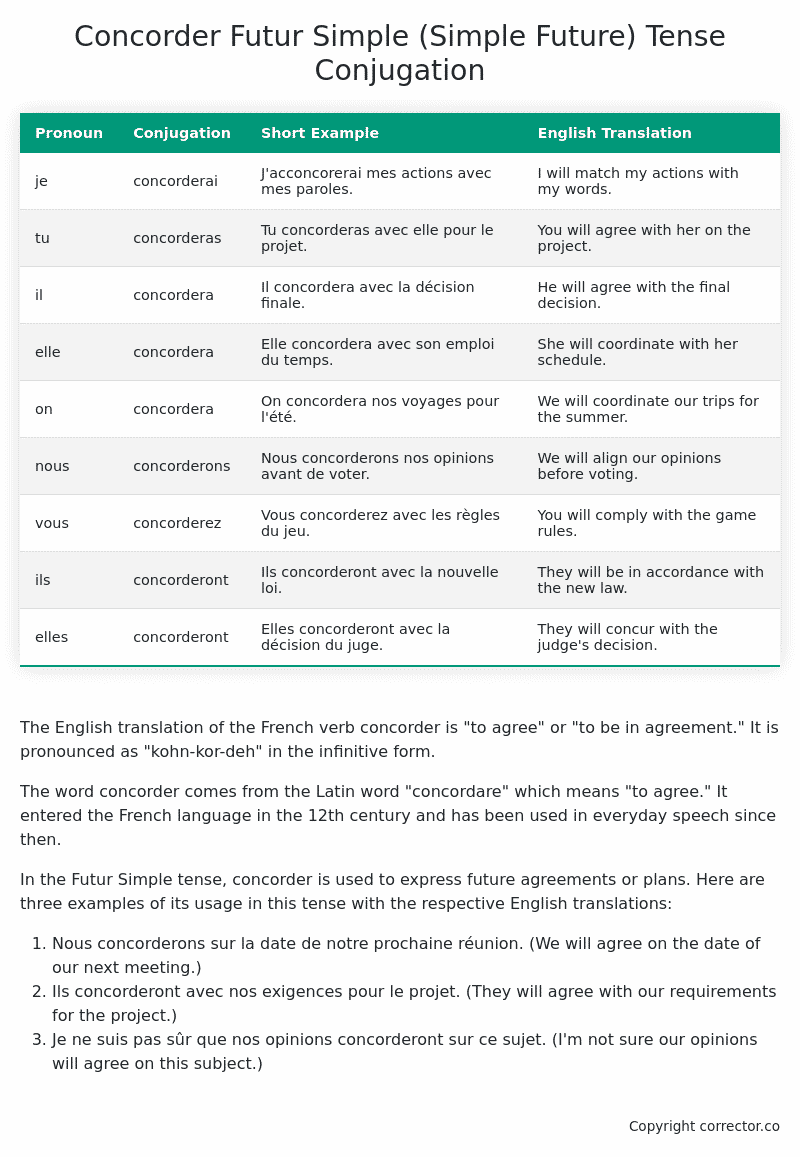Futur Simple (Simple Future) Tense Conjugation of the French Verb concorder
Introduction to the verb concorder
The English translation of the French verb concorder is “to agree” or “to be in agreement.” It is pronounced as “kohn-kor-deh” in the infinitive form.
The word concorder comes from the Latin word “concordare” which means “to agree.” It entered the French language in the 12th century and has been used in everyday speech since then.
In the Futur Simple tense, concorder is used to express future agreements or plans. Here are three examples of its usage in this tense with the respective English translations:
- Nous concorderons sur la date de notre prochaine réunion. (We will agree on the date of our next meeting.)
- Ils concorderont avec nos exigences pour le projet. (They will agree with our requirements for the project.)
- Je ne suis pas sûr que nos opinions concorderont sur ce sujet. (I’m not sure our opinions will agree on this subject.)
Table of the Futur Simple (Simple Future) Tense Conjugation of concorder
| Pronoun | Conjugation | Short Example | English Translation |
|---|---|---|---|
| je | concorderai | J’acconcorerai mes actions avec mes paroles. | I will match my actions with my words. |
| tu | concorderas | Tu concorderas avec elle pour le projet. | You will agree with her on the project. |
| il | concordera | Il concordera avec la décision finale. | He will agree with the final decision. |
| elle | concordera | Elle concordera avec son emploi du temps. | She will coordinate with her schedule. |
| on | concordera | On concordera nos voyages pour l’été. | We will coordinate our trips for the summer. |
| nous | concorderons | Nous concorderons nos opinions avant de voter. | We will align our opinions before voting. |
| vous | concorderez | Vous concorderez avec les règles du jeu. | You will comply with the game rules. |
| ils | concorderont | Ils concorderont avec la nouvelle loi. | They will be in accordance with the new law. |
| elles | concorderont | Elles concorderont avec la décision du juge. | They will concur with the judge’s decision. |
Other Conjugations for Concorder.
Le Present (Present Tense) Conjugation of the French Verb concorder
Imparfait (Imperfect) Tense Conjugation of the French Verb concorder
Passé Simple (Simple Past) Tense Conjugation of the French Verb concorder
Passé Composé (Present Perfect) Tense Conjugation of the French Verb concorder
Futur Simple (Simple Future) Tense Conjugation of the French Verb concorder (this article)
Futur Proche (Near Future) Tense Conjugation of the French Verb concorder
Plus-que-parfait (Pluperfect) Tense Conjugation of the French Verb concorder
Passé Antérieur (Past Anterior) Tense Conjugation of the French Verb concorder
Futur Antérieur (Future Anterior) Tense Conjugation of the French Verb concorder
Subjonctif Présent (Subjunctive Present) Tense Conjugation of the French Verb concorder
Subjonctif Passé (Subjunctive Past) Tense Conjugation of the French Verb concorder
Subjonctif Imparfait (Subjunctive Imperfect) Tense Conjugation of the French Verb concorder
Subjonctif Plus-que-parfait (Subjunctive Pluperfect) Tense Conjugation of the French Verb concorder
Conditionnel Présent (Conditional Present) Tense Conjugation of the French Verb concorder
Conditionnel Passé (Conditional Past) Tense Conjugation of the French Verb concorder
L’impératif Présent (Imperative Present) Tense Conjugation of the French Verb concorder
L’infinitif Présent (Infinitive Present) Tense Conjugation of the French Verb concorder
Struggling with French verbs or the language in general? Why not use our free French Grammar Checker – no registration required!
Get a FREE Download Study Sheet of this Conjugation 🔥
Simply right click the image below, click “save image” and get your free reference for the concorder Futur Simple tense conjugation!

Concorder – About the French Futur Simple (Simple Future) Tense
Formation of Futur Simple
For regular -er verbs (e.g., parler – to speak)
For regular -ir verbs (e.g., finir – to finish)
For regular -re verbs (e.g., vendre – to sell)
Common Everyday Usage Patterns
Conditional Statements
Interactions with Other Tenses
Futur Antérieur
Conditional
Present
Summary
I hope you enjoyed this article on the verb concorder. Still in a learning mood? Check out another TOTALLY random French verb conjugation!


